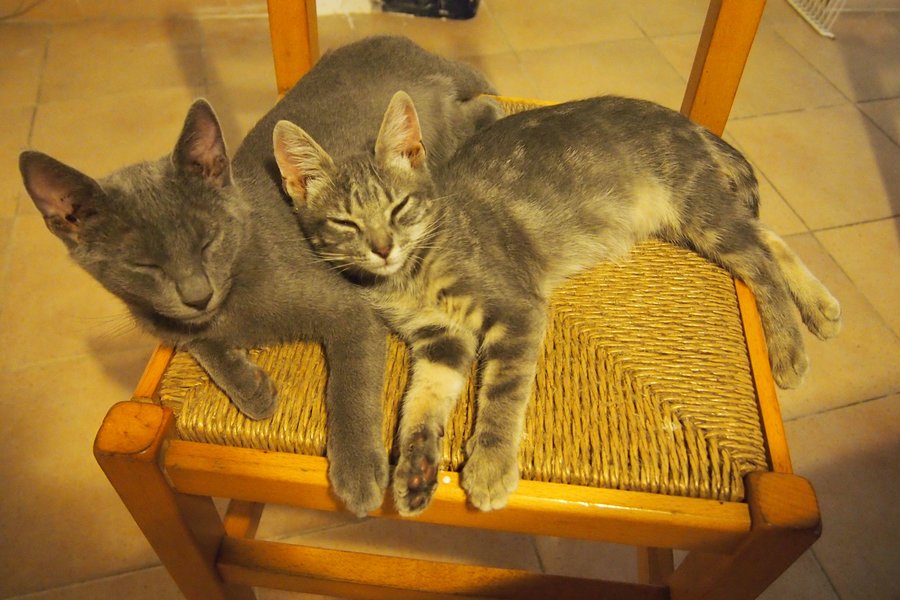I have two lovely 7-month old cats. A male and female. They were very healthy, happy kittens until one month ago when they both started to have diarrhea. Long story short, the male became very ill 4 days ago (hanging his head over the water bowl & vomiting a frothy yellow liquid), and was diagnosed with panleukopenia virus (or Feline Distemper). We didn't vaccinate them. Lesson learned.
Buddy (the male) has spent 3 nights at the vet and we are praying he survives on the supportive care he is receiving (IV, antibiotics, and homeopathic medicine). The report today is that he is still not eating or drinking, so will have to stay another night. The vet says that every moment he survives is a good sign that his immune system is recovering ~ but I wonder about this.
I have a couple of questions for anyone out there who has been lucky enough to see a cat fight off Feline Distemper and survive:
1) How long, in your experience, does a healthy cat require supportive care? I've read that if a cat survives the first 48 hours, it has a "good chance" of surviving ~ but that doesn't say much, does it. How long did you have your kitty on IV before they started to recover?
2) The other cat, a female, a tiny, feisty little thing ~ is not showing any of Buddy's symptoms yet. Her diarrhea has gone away and the only abnormal behavior is her attachment to me, which I take as a sign that she is missing Buddy. Is it possible for some cats to beat this virus without showing any symptoms? Or is it just a matter of time. They share everything ~ so I'm positive that if Buddy has the virus, she does as well.
3) What is the best care I can give Buddy if/when he recovers and comes home from the vet? I'm worried that his immune system will still be very weak, so I'm thinking hand-feeding and encouraging him to drink water, keeping him warm, and showering him with a lot of TLC. Any other specific advice you can give to help him get strong?
4) After beating the virus, how long did it take until your kitty was back to normal? Buddy was a very playful, healthy cat, who loved to play with bottle caps (his favorite toy) and climb trees. Seeing him with this virus, I'm worried he will never be the same again. How long will it take until I have my old Buddy back?
Thanks everyone!
Here's a photo of Buddy (left) & Bastét
Buddy (the male) has spent 3 nights at the vet and we are praying he survives on the supportive care he is receiving (IV, antibiotics, and homeopathic medicine). The report today is that he is still not eating or drinking, so will have to stay another night. The vet says that every moment he survives is a good sign that his immune system is recovering ~ but I wonder about this.
I have a couple of questions for anyone out there who has been lucky enough to see a cat fight off Feline Distemper and survive:
1) How long, in your experience, does a healthy cat require supportive care? I've read that if a cat survives the first 48 hours, it has a "good chance" of surviving ~ but that doesn't say much, does it. How long did you have your kitty on IV before they started to recover?
2) The other cat, a female, a tiny, feisty little thing ~ is not showing any of Buddy's symptoms yet. Her diarrhea has gone away and the only abnormal behavior is her attachment to me, which I take as a sign that she is missing Buddy. Is it possible for some cats to beat this virus without showing any symptoms? Or is it just a matter of time. They share everything ~ so I'm positive that if Buddy has the virus, she does as well.
3) What is the best care I can give Buddy if/when he recovers and comes home from the vet? I'm worried that his immune system will still be very weak, so I'm thinking hand-feeding and encouraging him to drink water, keeping him warm, and showering him with a lot of TLC. Any other specific advice you can give to help him get strong?
4) After beating the virus, how long did it take until your kitty was back to normal? Buddy was a very playful, healthy cat, who loved to play with bottle caps (his favorite toy) and climb trees. Seeing him with this virus, I'm worried he will never be the same again. How long will it take until I have my old Buddy back?
Thanks everyone!
Here's a photo of Buddy (left) & Bastét






